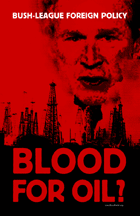 It's hard to miss the point of the "Blood for Oil" Web site. It features one poster of an American flag with "Blood for oil?" in white block letters where the stars should be and two dripping red handprints across the stripes. Another shows a photo of President Bush with a thin black line on his upper lip. "Got oil?" the headline asks wryly.
It's hard to miss the point of the "Blood for Oil" Web site. It features one poster of an American flag with "Blood for oil?" in white block letters where the stars should be and two dripping red handprints across the stripes. Another shows a photo of President Bush with a thin black line on his upper lip. "Got oil?" the headline asks wryly.
Five years after the United States invaded Iraq, plenty of people believe that the war was waged chiefly to secure U.S. petroleum supplies and to make Iraq safe -- and lucrative -- for the U.S. oil industry.
We may not know the real motivations behind the Iraq war for years, but it remains difficult to distill oil from all the possibilities. That's because our society and economy have been nursed on cheap oil, and the idea that oil security is a right as well as a necessity has become part of our foreign policy DNA, handed down from Franklin D. Roosevelt to Jimmy Carter to George H.W. Bush. And the war and its untidy aftermath have, in fact, swelled the coffers of the world's biggest oil companies.
But it hasn't happened in the way anyone might have imagined.
Instead of making Iraq an open economy fueled by a thriving oil sector, the war has failed to boost the flow of oil from Iraq's giant well-mapped reservoirs, which oil experts say could rival Saudi Arabia's and produce 6 million barrels a day, if not more.